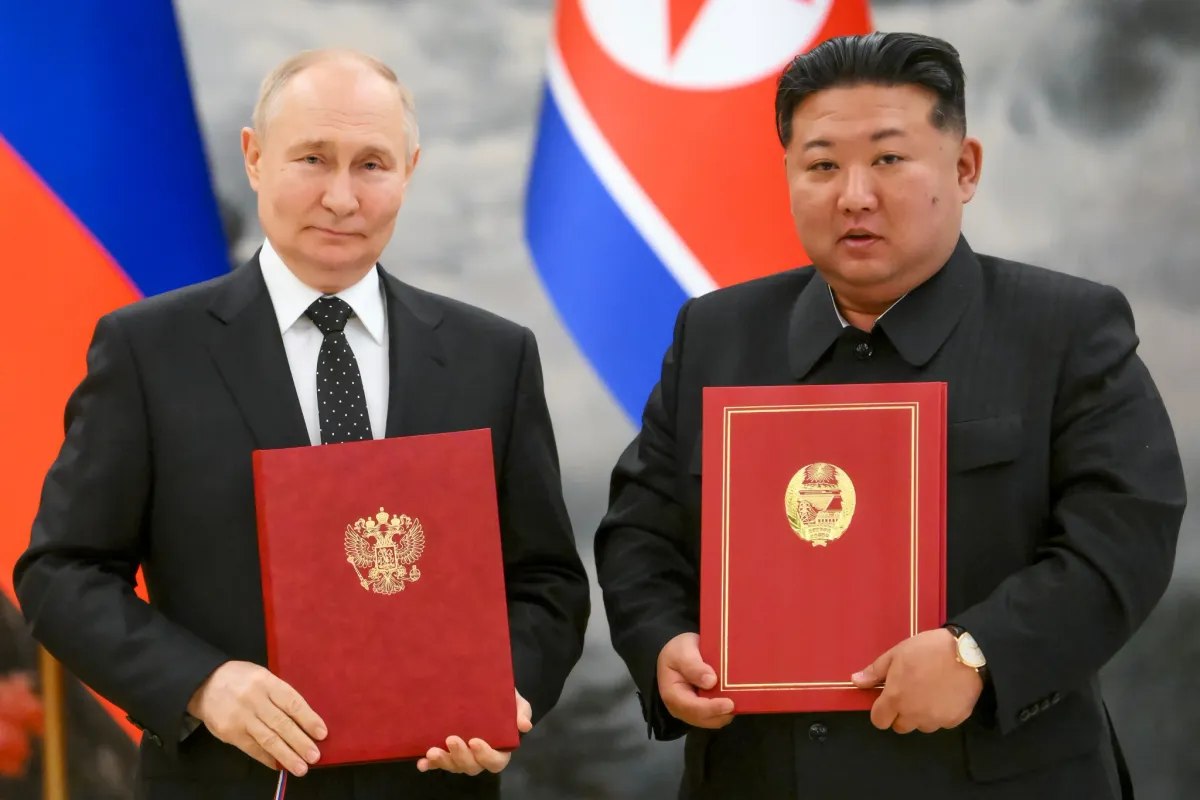Russia-NK partnership, Scandals Dog Presidential Admin, Shipbuilding Surges
Russia-North Korea Partnership Raises Tensions, Presidential Scandals Persist as Investigations Intensify, Government Throws Support to Surging Shipbuilding Industry

Russia-North Korea Partnership Raises Tensions
The announcement of a new "Comprehensive Strategic Partnership" between Russia and North Korea marks a significant challenge to South Korea and her allies. This agreement elevates the relationship between the two countries to a whole new level, replacing previous "friendship" treaties with a far more substantial strategic alignment. It signals a major upgrade in diplomatic and security cooperation, driven by shared anti-US sentiment and converging geopolitical interests. The specific nature of the partnership will be defined by the precise wording of the agreement, but it clearly represents a momentous realignment with far-reaching implications for Northeast Asia.
One of the most consequential aspects of the new partnership is the potential for expanded military cooperation and joint exercises between Russia and North Korea. While existing treaties had limited provisions for security collaboration, the new agreement is likely to spell out these ties in much greater detail. This could include regularizing high-level defense dialogues, deepening cooperation on weapons development, and even conducting joint military drills. Such activities would enhance the interoperability of Russian and North Korean forces, potentially integrating their air defense, missile, and naval systems and doctrines. From a strategic perspective, this would greatly complicate US and allied contingency planning in the region.
Another key dimension of the partnership is the prospect of increased sharing of sensitive technologies and expertise between Russia and North Korea. As a major military power, Russia is well-positioned to provide advanced hardware and know-how to its North Korean partner, ranging from fighter jets and air defense systems to submarines and precision-guided munitions. It could share valuable battlefield knowledge gleaned from the ongoing Ukraine war, helping the North overcome technical barriers in its own weapons programs. Cooperation may also extend to cutting-edge domains like space, cyber, and electronic warfare, as well as dual-use technologies that can boost both military and economic capabilities. By enabling such transfers, Russia risks undermining the international community's efforts to limit North Korea's destabilizing activities.
Cooperation may extend to cutting-edge domains like space, cyber, and electronic warfare, as well as dual-use technologies that can boost both military and economic capabilities.
The partnership agreement also has significant implications for both countries' ability to withstand and circumvent the mounting international sanctions arrayed against them. As Russia and North Korea find themselves increasingly isolated and targeted by economic restrictions and financial penalties, they can leverage their new alignment to mitigate the impact. This could involve developing alternative trade channels, payment systems, and banking mechanisms outside the Western-dominated financial architecture. They may also coordinate to facilitate illicit networks and sanctions evasion schemes, while providing each other with much-needed economic relief through barter trade, loans, and aid. On the diplomatic front, they can offer mutual cover and protection in international forums, further emboldening North Korean defiance of denuclearization demands.
In the broader geopolitical context, the Russia-North Korea partnership must be understood as part of Moscow's concerted efforts to reassert its influence in Northeast Asia and push back against US dominance. By cultivating closer ties with Pyongyang, Russia seeks to project power, secure its interests, and expand its options in the region, even as it remains bogged down in the Ukraine conflict. It is effectively exploiting the fissures and tensions in the US alliance system to undermine Washington's standing and forward presence. This dovetails with the wider pattern of growing strategic convergence between Russia and China, who share a common interest in eroding the US-led security order in the Indo-Pacific. As a result, the Korean Peninsula is becoming an increasingly salient battleground in the intensifying great power competition between the US, China, and Russia.
Of course, the actual implementation of the new strategic partnership remains to be seen, as Russia and North Korea still face significant challenges and constraints. The two countries have a long history of mutual mistrust and friction, and their competing priorities and interests could create obstacles down the line. There are also inherent coordination challenges given the differences in their command structures, decision-making processes, and strategic cultures. Moreover, Russia's own economic difficulties and competing military commitments may limit its ability to follow through on material support for North Korea, especially in the face of international scrutiny and pressure. Nevertheless, the underlying strategic logic and momentum behind the partnership is clear, to the detriment of the region.
Presidential Scandals Persist as Investigations Intensify
The presidential scandals that have been brewing for months in Korea are showing no signs of abating. In fact, they appear to be intensifying as new revelations emerge and investigations gain momentum. The two main issues currently in the spotlight are the suspicious death of a Marine and allegations of the First Lady receiving luxury bags from a foreign national. Both cases have raised serious questions about abuse of power, preferential treatment, and the overall integrity of the Yoon administration.